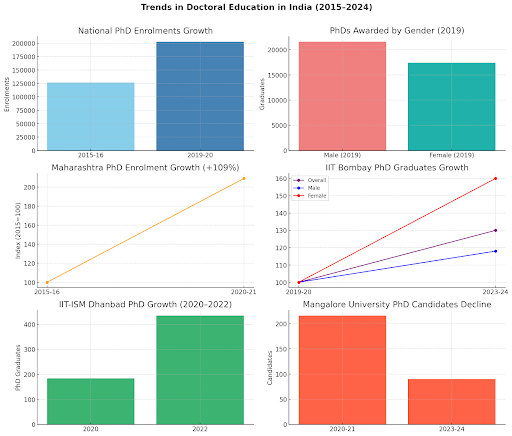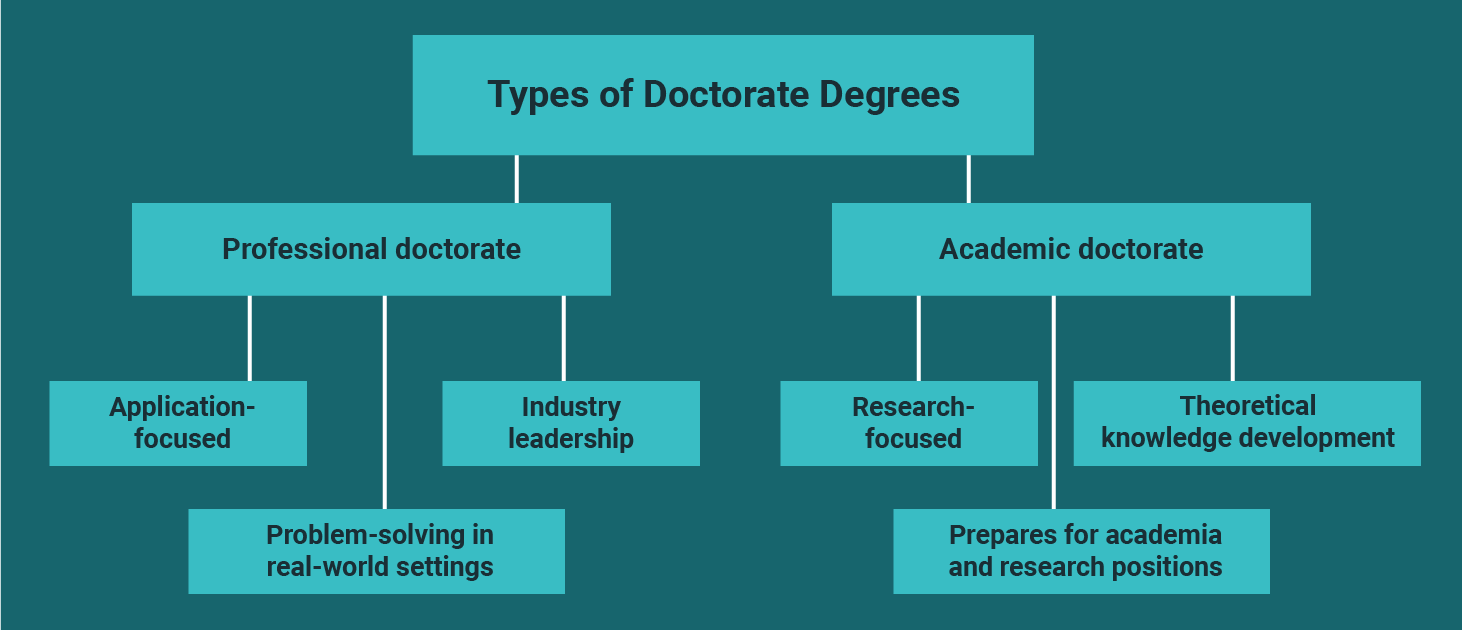What Is a Doctorate Degree? Key Facts
Table of Contents

You’re a master’s graduate, but still you want to continue with your studies? Maybe you’re trying to figure out what it means and what the various options are after successfully having a master’s degree? The pinnacle of educational achievement is the doctoral degree.
But what exactly is it? How can you get it, and what are the different types? Consider this blog as your introduction to a doctoral degree, where we will discuss some important facts about it.
However, before moving forward, let us provide an overview: A person with a doctoral degree not only advances their career but also enables them to secure the highest-paying job. Companies consider a doctorate degree as a person with subject expertise.
What Is a Doctorate Degree?
Often referred to as a PhD(Doctor of Philosophy), the doctorate degree is one of the highest and most advanced academic degrees that a person can earn. It represents that you have expertise in a specific academic discipline or a field of profession.
However, there is one important thing to consider: pursuing a doctorate degree means dedicating yourself to a significant level of research and articulation. Those who hold this degree have thoroughly researched the given subject matters and dedicated themselves to analysis, offering new interpretations to the field.
To qualify for these programmes, you are also qualified for top-tier consulting and education career positions. It gives you the edge to stay out in today’s competitive job market.
Demand for Doctoral Degrees

In the last 10 years, the expansion of doctoral education in India has grown remarkably. From the period 2015-16 to 2019-20, the PhD enrolments grew from ~126,451 to ~202,550, or a 60% increase. Of note, in the year 2019, there were nearly 38,986 students who earned PhDs, approximately 21,577 of whom were male, and 17,409 were female.
Understanding this growth is down to some states, in the case of Maharashtra: PhD enrolment more than doubled from the last five years (109%), which was accentuated during the pandemic, from 2019-20 to 2020-21.
Among premier institutions, this ranking is higher. IIT Bombay saw an increase of over 30% in PhD graduates from 2019-20 to 2023-24, with female students reflecting an almost 60% increase, whereas that of male students was less than 20% In addition, IIT-ISM Dhanbad saw an increase of more than twice (184 PhDs in 2020 to 434 PhDs in 2022). – an astonishing increase of 84%.
Earning a doctorate is both challenging and rewarding, but do you know what to truly expect from the journey? We invite you to visit Jaro Education’s website and explore the Doctor of Business Administration (DBA) program. Get valuable insights and resources that can help you on your path to success!
Types of Doctorate Degrees

*potomac.edu
A doctorate degree is categorised into two types, i.e., professional and academic. The type you choose depends on the field you want to study, and of course, it’s the highest degree in any field.
Professional doctorate
A professional doctorate degree is an advanced postgraduate degree that consists of independent study in a student’s area of expertise. These types of doctorate degrees are mainly designed for experts looking for advanced, career-focused knowledge in various fields like law, business, and medicine.
Given below are various types of professional doctorates:
- Doctor of Education (EdD)
- Doctor of Business Administration (DBA)
- Doctor of Chiropractic (DC)
- Doctor of Dental Medicine (DMD)
- Doctor of Dental Surgery (DDS)
- Doctor of Podiatric Medicine (DPM)
- Doctor of Veterinary Medicine (DVM)
- Juris Doctor (JD)
Academic doctorate
A PhD (Doctor of Philosophy) is an academic degree that focuses on original research and is typically obtained by writing a dissertation. Since it is generally the highest academic degree, people who obtain it work as professors or researchers in universities. However, the skills gained from the degree, such as critical thinking, problem-solving, and data analysis, among others, are applicable in many other sectors.
The majority of graduates engage with a wide market in consulting, government, policy, and leadership in the private sector. While a PhD embodies a profound level of knowledge of a subject area, it also demonstrates the capacity for independent research, making it a professional abbreviation that is respected in both academic and non-academic careers.
Types of academic doctorates include:
- Doctor of Philosophy (PhD)
- Doctor of Design (DDes)
- Doctor of Fine Arts (DFA)
- Doctor of Theology (ThD)
How to Get a Doctorate Degree
Earning a doctorate (academic or professional) takes time and is worth it if you are committed and understand how the process works. Here are the steps that you can follow:
1. Fulfil the Educational
- Bachelor’s degree: This is the minimum requirement.
- Master’s degree (may not be required): Many doctoral programs expect applicants to hold a master’s degree, though some programs do allow applicants to enter directly with a bachelor’s degree for strong candidates.
2. Academic Experience
Your academic record is a valuable part of your profile. If you earned high grades, it strengthens your profile effectively.
- CV/Resume: Show any research experience, internships, or relevant work experience.
- Letters of Recommendation: Ask professors or people from your job to write your recommendation. Your letter writers should be able to demonstrate your academic potential.
- Statement of Purpose (SOP): You must show your academic career goals and plans for research by attending graduate school.
- Entrance Exams: Some graduate programs are associated with standardised tests such GRE, GMAT, and/or national-level testing systems such as the UGC-NET in India.
3. Complete Coursework
- Once admitted, you’ll start with advanced coursework to build expertise.
- This typically lasts 1–3 years, depending on your program and discipline.
4. Pass Comprehensive Exams
- After coursework, you must clear exams to demonstrate mastery of your field.
- These tests ensure you’re ready to move on to independent research.
5.Conduct Original Research
- The most critical stage involves designing and executing original research.
- You’ll work under a supervisor to explore new ideas, solve problems, and make a contribution to your discipline.
6. Write and Defend Your Dissertation
- Your research concludes with a doctoral dissertation or capstone project.
- You’ll defend it before a panel of experts, proving your ability to conduct independent scholarly work.
How Long Does It Take to Get a Doctorate Degree?
How long does it take to earn a doctorate? The answer depends on your program, field of study, and your own circumstances, so it will vary for each doctoral student. On average, doctoral students take approximately 7.3 years after starting graduate school to complete their doctoral degree.
If you are in a PhD program in research and academia, a reasonable expectation for completing the degree is around five to seven years.
The pace of study (full-time versus part-time) also influences how long it takes. A full-time student most likely completes the program at a much faster pace than part-time students who might have to balance work, family, or other considerations.
On the other hand, online doctorate programs are also becoming increasingly popular, especially for working professionals. These programs often provide greater flexibility, allowing students to complete coursework remotely and at their own pace. Depending on the design of the program, an online doctorate may be completed within two years, offering the same value as a traditional programme. Professional doctorates, such as a Doctor of Business Administration (DBA), are often completed in two years. You can get complete details about this by visiting Jaro Education’s website.
Lastly, depending upon the programme specification, one can learn about how long it takes to complete the degree. Thus, it is recommended for every student to go through institution’s requirements and course structure to make an informed decision.
Conclusion
Knowledge is power in today’s society, and a doctoral degree is one of the highest degrees of accomplishment. Whether you seek leadership opportunities, want to build the landscape with your research, or educate students at one of the world’s best universities, earning your doctoral degree will allow you access that other degrees will not give you.
However, if you are unsure or feeling hesitant about whether or not a doctoral degree is right for you, pursuing a master’s first can be a good way to see if a doctorate is the right long-term plan for you. Additionally, if you are looking for flexibility with your education, many online doctoral programs in healthcare, business, and law are available for you, which provide a pathway for advanced education.
Some of these programs at the doctoral level are offered by the best universities in the world through Jaro Education, so you can fit quality world-class learning into your life without the need to quit your career.
Not sure which program is the right fit for you? Simply visit the Jaro Education Contact Us page to connect with their expert support team and get personalised guidance for your journey ahead.
Frequently Asked Questions
How rare is it to hold a doctorate degree?
Extremely rare; only about 2% of the population in the world has a doctorate. This is why the doctorate is seen as such a prestigious and respected credential.
What comes after a doctorate degree?
A doctorate is the highest level of degree you can earn; however, many graduates continue their education and offer postdoctoral research. Others might also receive an honorary doctorate degree in recognition of what they have given back to the world.
Is a doctorate worth it?
Whether a doctorate is worthwhile depends on the industry, the career you want, and the demand.
What do you call a doctorate?
A person who has a doctorate can be referred to as “Doctor” (Dr.) and will most likely be called that in academic, medical, and professional usage.

















